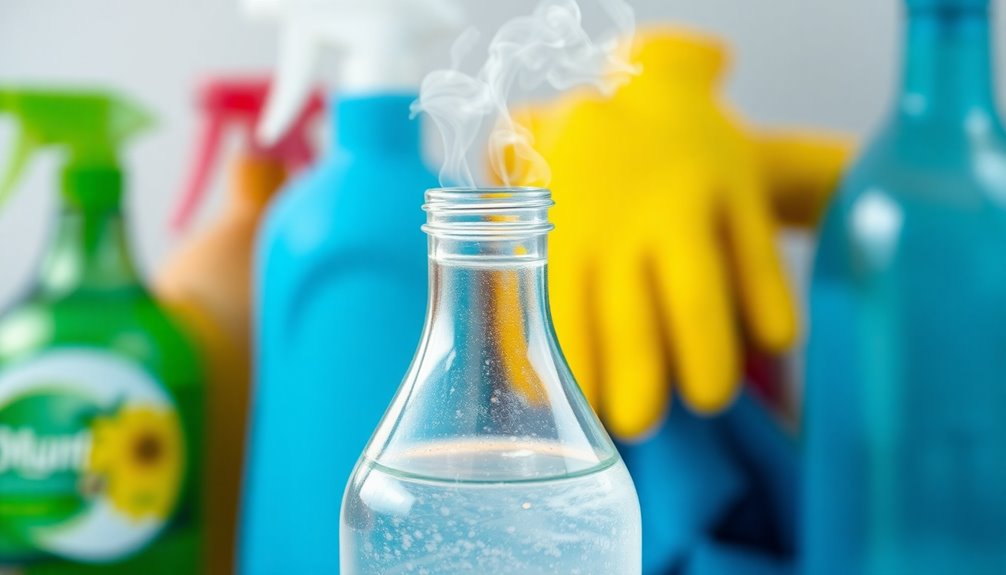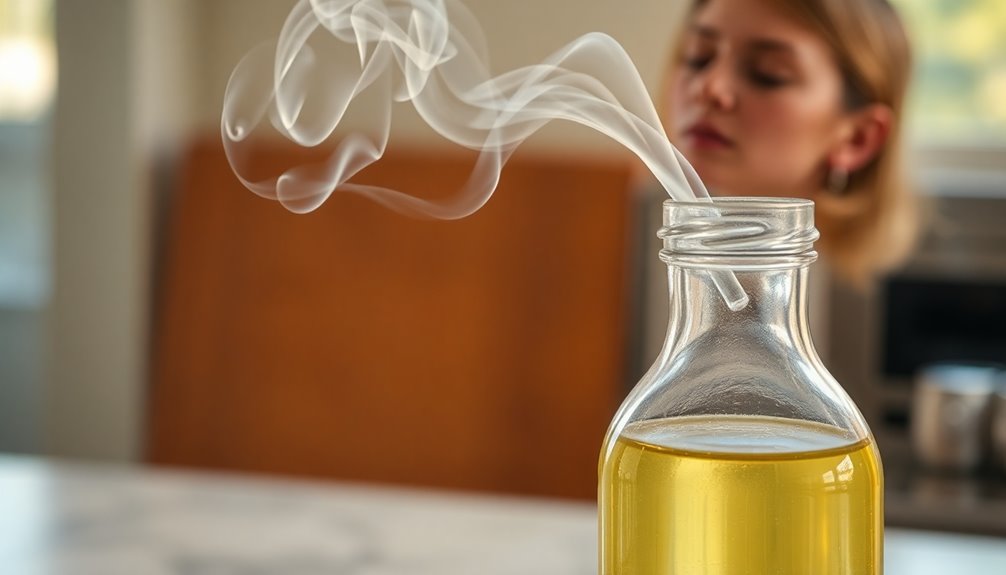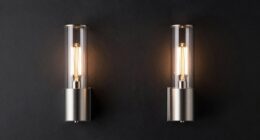Inhaling vinegar fumes can irritate your respiratory system, causing coughing, throat discomfort, and headaches. If you have asthma or other respiratory conditions, you're at a higher risk of severe symptoms, which may include shortness of breath. To protect yourself, always guarantee good ventilation when using vinegar. Consider wearing masks and gloves, and avoid prolonged exposure in enclosed spaces. It's also crucial not to mix vinegar with bleach or ammonia, as this can create hazardous gases. There are alternative cleaning solutions that can be safer. Keep exploring to discover more health tips and safer cleaning practices.
Key Takeaways
- Inhaling vinegar fumes can irritate the respiratory system, causing coughing, throat discomfort, and headaches.
- Individuals with asthma or respiratory conditions are at higher risk for severe reactions.
- Prolonged exposure to vinegar fumes may lead to shortness of breath and necessitate medical attention.
- To mitigate risks, ensure good ventilation, use protective gear, and limit exposure time.
- Consider using alternative cleaning solutions like baking soda or hydrogen peroxide to avoid vinegar fume exposure.
Health Risks of Vinegar Fumes

When you inhale vinegar fumes, you're exposing your respiratory system to acetic acid, which can lead to irritation. This irritation may cause symptoms like coughing, throat discomfort, and headaches.
If you have asthma or other respiratory conditions, the risks increase, potentially worsening existing issues. Prolonged exposure to vinegar can lead to shortness of breath and persistent discomfort that might need medical attention.
It's important to guarantee good ventilation while cleaning to minimize fume concentration and reduce the risk of respiratory irritation.
If you experience severe reactions or difficulty breathing, seek immediate medical help to address any complications.
Stay aware of how vinegar fumes affect your respiratory system to keep yourself safe while cleaning.
Safe Cleaning Tips

When you're cleaning with vinegar, always make sure the area is well-ventilated by opening windows and doors.
Don't forget to wear protective gear like masks and gloves to keep yourself safe from irritation.
Additionally, consider diluting the vinegar to make your cleaning tasks more comfortable.
Proper Ventilation Importance
To guarantee a safe cleaning experience with vinegar, proper ventilation is essential. Opening windows and doors helps disperse irritating fumes, reducing respiratory risks, especially for those with asthma. Consider using fans to enhance airflow while you clean. Limiting your time in the area and taking breaks can further minimize exposure to harmful fumes. Always rinse surfaces thoroughly after using vinegar to prevent lingering odors that could cause irritation. Additionally, it's important to be aware that some cleaning products, including vinegar, can be harmful when mixed with other substances, such as newborn sunscreens, which can release toxic fumes.
| Tips for Proper Ventilation | Benefits |
|---|---|
| Open windows and doors | Disperses fumes |
| Use fans | Enhances airflow |
| Take breaks | Reduces exposure |
| Rinse surfaces | Eliminates residues |
Protective Gear Usage
Using protective gear while cleaning with vinegar is crucial for your safety and comfort. The acidic nature of vinegar can cause irritation, so it's important to take precautions.
Here are four key items to take into account:
- Mask: A good mask filters out irritants, helping to prevent respiratory issues like coughing or shortness of breath.
- Gloves: Wear gloves to protect your skin from irritation and avoid direct contact with vinegar.
- Goggles: Safety goggles can shield your eyes from splashes.
- Apron: An apron keeps your clothes clean and provides an extra layer of protection.
Always verify your protective gear is appropriate for the task, and regularly check for wear and tear to maintain maximum safety while cleaning.
Dilution and Application Techniques
While cleaning with vinegar can be effective, it's critical to dilute it properly to confirm safety and reduce irritation. Mixing vinegar and water in a 1:1 ratio minimizes fume intensity. Here are some key tips for safe application:
| Technique | Description | Benefits |
|---|---|---|
| Dilution | Mix vinegar and water (1:1 ratio) | Reduces irritation |
| Application | Use a spray bottle to control the amount | Minimizes excessive vapors |
| Ventilation | Open windows and doors while cleaning | Guarantees fresh air circulation |
| Time Limitation | Limit time in enclosed spaces with vinegar | Reduces fume exposure |
| Rinse Thoroughly | Rinse surfaces with water after cleaning | Prevents residue buildup |
Chemical Reactions to Avoid

Avoiding certain chemical combinations is essential when working with vinegar, as mixing it with bleach can produce toxic chlorine gas that severely irritates your respiratory system.
Here are key reactions to avoid:
- Never mix vinegar with bleach – This combo creates harmful chlorine gas.
- Avoid vinegar and ammonia – This mix releases irritating vapors that can harm your lungs and eyes.
- Don't use concentrated vinegar – Its fumes can irritate your mucous membranes, leading to coughing and shortness of breath.
- Ensure proper ventilation – When you use vinegar to clean, open windows to minimize fume concentration.
Taking these precautions can help you clean safely and protect your health.
Always check compatibility before mixing any cleaning agents.
Alternative Cleaning Solutions

When it comes to cleaning, there are several effective alternatives to vinegar that can help you achieve a spotless home without the risk of harmful fumes. Consider these options:
| Cleaning Agent | Benefits | Usage |
|---|---|---|
| Baking Soda | Non-toxic, deodorizes, scrubs | Sprinkle on surfaces, scrub |
| Hydrogen Peroxide | Disinfects, kills bacteria/viruses | Spray on surfaces, let sit |
| Essential Oils | Pleasant scents, antimicrobial | Mix with water for cleaning |
| Cornstarch & Water | Streak-free glass cleaner | Wipe windows and mirrors |
These alternatives not only help you maintain a clean space but also protect your health. By using these safer options, you can enjoy effective cleaning without the irritation of vinegar fumes. Additionally, many people are turning to natural sweetening alternatives like honey for non-toxic cleaning solutions due to its antibacterial properties.
Emergency Response Measures

Inhaling vinegar fumes can lead to uncomfortable symptoms, so knowing how to respond is essential for your safety. Here are some emergency response measures to follow:
- Get Fresh Air: If you experience mild irritation, move to an area with fresh air and monitor your symptoms.
- Rinse Eyes: For eye irritation, rinse your eyes with water for at least 15 minutes and seek medical advice if discomfort persists.
- Contact Poison Control: Keep the Poison Control number (1-800-222-1222) handy for expert guidance on inhalation incidents.
- Seek Emergency Services: If you have difficulty breathing or severe symptoms, contact emergency services immediately.
Always document your symptoms and report them to a healthcare provider for proper evaluation and treatment. Your health matters!
Understanding Vinegar's Uses

After addressing the immediate concerns of inhaling vinegar fumes, it's important to recognize the many beneficial uses of vinegar in everyday life.
Vinegar, especially white distilled, is a powerful cleaning agent due to its acetic acid content, effectively removing stains and odors while sanitizing surfaces.
In the kitchen, you can use vinegar in pickling, marinades, and salad dressings to enhance flavors.
In gardening, it acts as a natural herbicide, targeting small annual broadleaf weeds without harsh chemicals.
Additionally, vinegar's acidity makes it an excellent option for washing fruits and vegetables, reducing bacteria and promoting food safety.
Using vinegar in these ways can also reflect an eco-friendly approach to household management, as it aligns with necessary cookies that enhance functionality without harmful additives.
Embracing vinegar in your routine can provide a range of practical applications, showcasing its versatility and effectiveness.
Frequently Asked Questions
What Should You Do if You Breathe in Vinegar Fumes?
If you breathe in vinegar fumes, you should act quickly.
First, move to an area with fresh air to ease your symptoms. Rinse your mouth and throat with water to soothe any irritation, but don't swallow a lot.
If you still have trouble breathing or your symptoms get worse, seek medical help right away.
To prevent this, always guarantee good ventilation when using vinegar for cleaning, and consider wearing a mask in confined spaces.
What Are the Hazardous Effects of Vinegar?
Vinegar can pose several hazards when used improperly. You might experience irritation in your respiratory system, leading to coughing and throat discomfort.
If you're exposed for too long, symptoms could worsen, potentially requiring medical attention. High concentrations of acetic acid can irritate your eyes and mucous membranes, too.
Always remember to ventilate your space when using vinegar, especially around other cleaning agents, to avoid dangerous reactions like toxic gas formation.
Stay safe!
What Happens When Vinegar Is Exposed to Air?
When vinegar's exposed to air, it begins to oxidize, which can lead to a decrease in acidity over time.
You might notice its characteristic sour smell becoming less potent. Additionally, vinegar can absorb surrounding odors, altering its flavor.
If left unsealed, bacteria could grow, potentially causing spoilage.
To maintain its quality and effectiveness, you should store vinegar in airtight containers, keeping it fresh and enhancing its culinary uses.
How Long Do Vinegar Fumes Last?
Picture a kitchen after a cleaning spree, the sharp scent of vinegar hanging in the air like a ghost.
Those vinegar fumes typically last about 30 minutes to an hour in well-ventilated spaces.
However, if you're in a cramped area, they might linger longer, intensifying the smell and irritation.
Warm temperatures and humidity can speed up evaporation, so crack open a window or turn on a fan to clear the air faster.
Conclusion
Inhaling vinegar fumes might seem harmless, but it can irritate your respiratory system, especially if you're sensitive. Don't let the fear of cleaning with vinegar hold you back—just use it wisely! By following safe cleaning tips and avoiding dangerous mixtures, you can enjoy the benefits of vinegar without the risks. So, embrace this natural cleaner, but stay aware of its effects. Your health matters, and with a little caution, you can keep your space fresh and safe!









